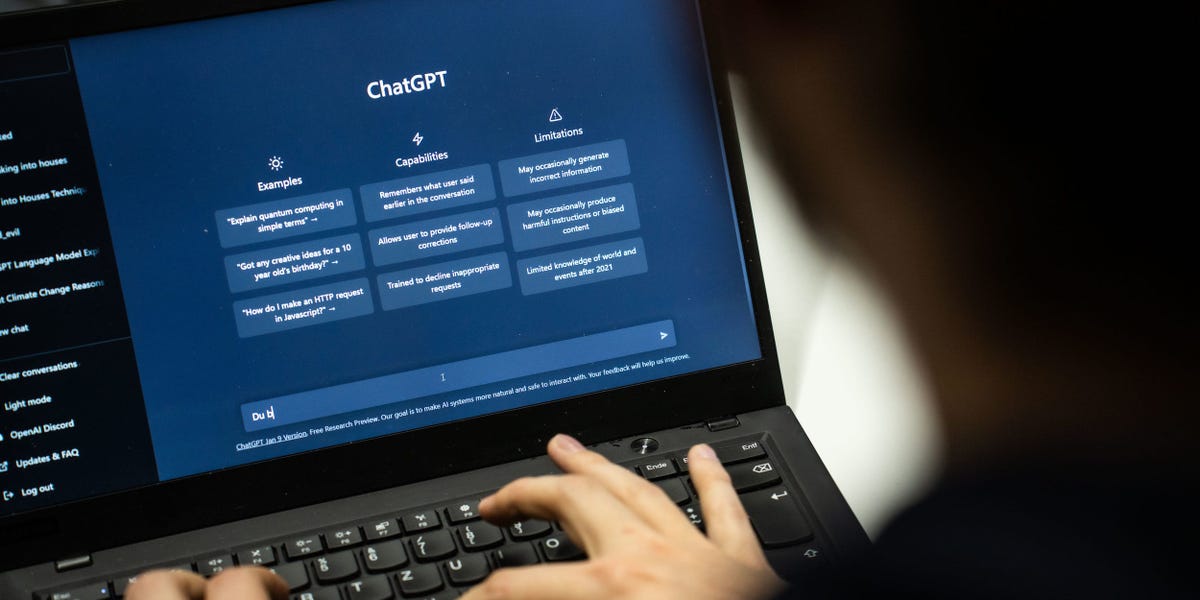- Applicants are using OpenAI’s ChatGPT to apply for jobs — at the cost of getting hired.
- Recruiters said they caught candidates using AI to write cover letters and answer questions.
- Some agree that ChatGPT can be useful in refining your application as long as it has a human touch.
Knowing how to use OpenAI’s ChatGPT could help you land your next job — unless you trust the AI chatbot to apply for the roles for you, recruiters told Insider.
Since ChatGPT came out almost a year ago, recruitment leaders at Nvidia, Jasper.ai, and Hugging Face seeking to fill their AI-related roles have said they’ve noticed an uptick in job applicants using the chatbot to help them move through the application process.
A National Bureau of Economic Research survey of nearly 500,000 job seekers in 2021 found that participants who received “algorithmic writing assistance” to help tweak their résumés were about 8% more likely to get hired than those who didn’t use AI.
While some recruiters have said they see the value in candidates using generative AI to strengthen their job applications, others believe that taking a chatbot’s suggestions at face value can hurt one’s chances of getting hired.
Alex Shapiro, the chief people officer at Jasper.ai, an AI marketing-and-writing software firm, said she’s noticed an increase in job seekers using generative-AI tools such as ChatGPT to help generate their résumés and cover letters.
Shapiro said that using ChatGPT can be “great” in helping applicants “brainstorm verbs” and reframe language that can “bring a level of polish to their applications.” At the same time, she said that submitting AI-generated materials along with job applications can backfire if applicants don’t review them for accuracy.
Shapiro said Jasper recruiters have interviewed candidates and discovered skills on their résumés that applicants said shouldn’t be there or characterizations they weren’t familiar with. Checking the AI-generated materials to ensure they accurately reflect an applicant’s capabilities, she said, is critical if they’re using ChatGPT — especially if the applicant gets hired.
“If you took yourself out of that process and just submitted it, that will be a problem down the line,” Shapiro told Insider.
A ‘really bad practice’
If used improperly, ChatGPT can stop a job applicant from moving forward in the hiring process.
Flavien Coronini, the talent-acquisition lead at Hugging Face, an AI company behind tools such as the text-to-image generator Stable Diffusion, said he’s seen cover letters that AI obviously generated with no human touch.
He recalled one cover letter that included the prompt “Insert a cover letter in order to explain why my background is a good fit for this role” — which he called a “really bad practice.”
“For me, this is a showstopper, because it doesn’t really show your motivation to join,” Coronini told Insider.
For some applicants, even the possibility of a company disqualifying a job candidate from consideration may still not be enough to prevent them from relying on ChatGPT.
Lindsey Duran, the vice president of global recruiting at Nvidia, said that recruiters at the chip giant have caught candidates using ChatGPT during interviews to answer questions even though they were explicitly told prior that using AI for that purpose was prohibited.
ChatGPT skills can boost your chances of getting hired — if you can prove it
Still, all the recruiters who spoke to Insider agreed that emphasizing AI skills — even if it’s ChatGPT expertise — during the hiring process can help job seekers stand out from the applicant pool. But they have to be able to prove their skills.
Chris Foltz, the chief talent officer at IBM, said applicants can increase their chances of getting an AI job by demonstrating their knowledge and passion for the subject during an interview. That could mean explaining how to apply AI tools such as ChatGPT to workflows, taking “industry-recognized” online courses in AI, or staying up-to-date with the latest developments in the field.
Shapiro and Duran echoed Foltz’s sentiment. When interviewing for technical and non-technical roles alike, the Jasper recruiter expects candidates to be able to articulate how they’ve been experimenting with AI tools such as ChatGPT because that shows “whether or not people have dived into this industry.”
Duran said she considers ChatGPT a “relatively newer skill” that the company takes into consideration for select roles, though she said the strongest applicants have “core foundational skills” in programming and algorithms. Coronini suggested applicants add GitHub links to past AI projects in their résumés.
Add a human touch to AI-generated job applications— or risk getting replaced
Still, there are ways job seekers can use ChatGPT to elevate their applications without them reading like they’re AI-generated.
Ashley Couto, a self-proclaimed AI consultant, previously wrote for Insider that job applicants can most effectively use ChatGPT to write a cover letter by specifying what it needs to contain and instructing the chatbot to revise certain sentences or paragraphs repeatedly until they reflect the applicant’s unique voice.
The human touch may be what stops job candidates from getting replaced by AI.
“If you’re not grappling with the content, and you don’t feel like you could represent it yourself, you can’t break down the logic behind it, I think we should probably just hire the technology,” Shapiro said.
Read the full article here





